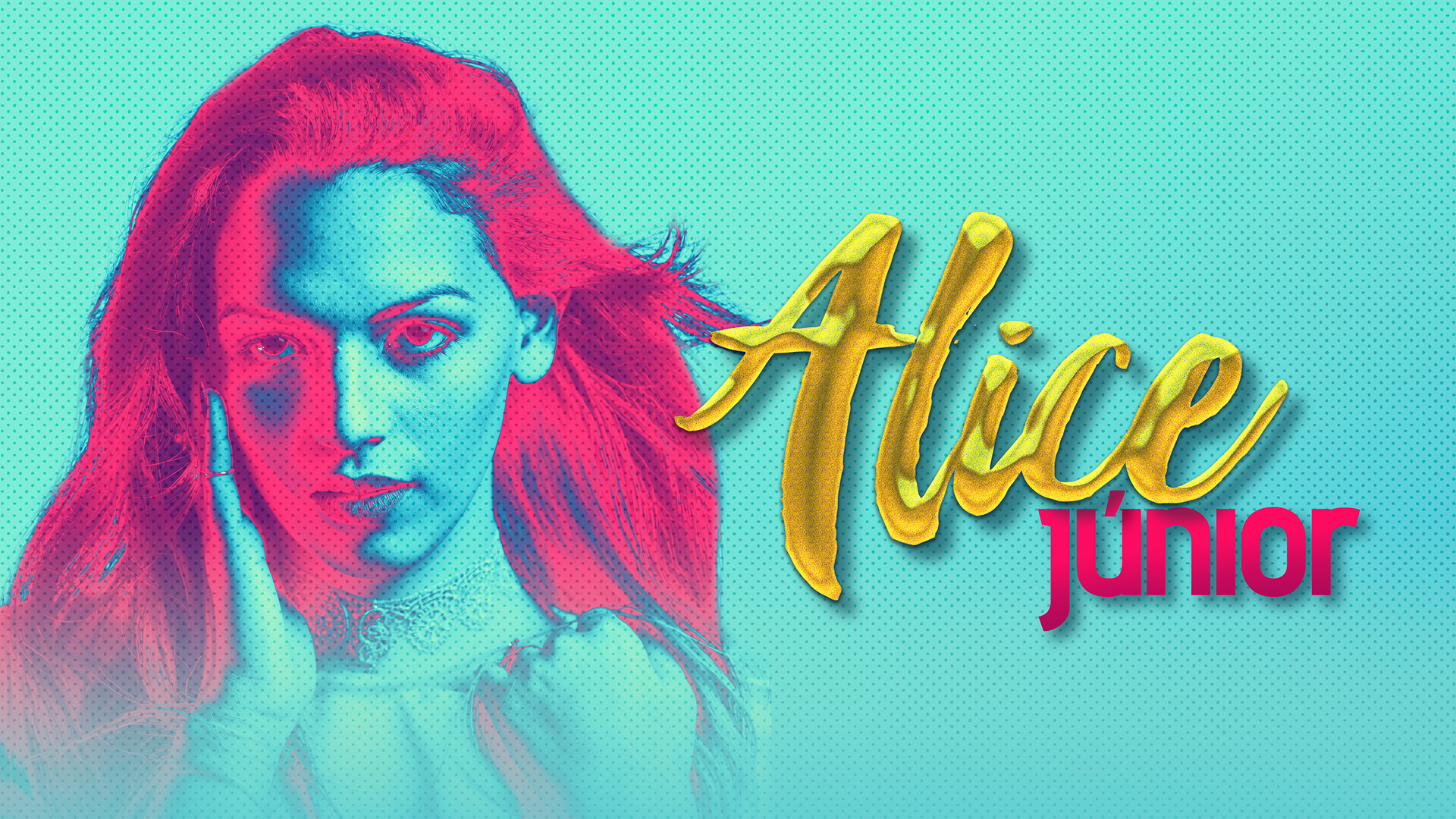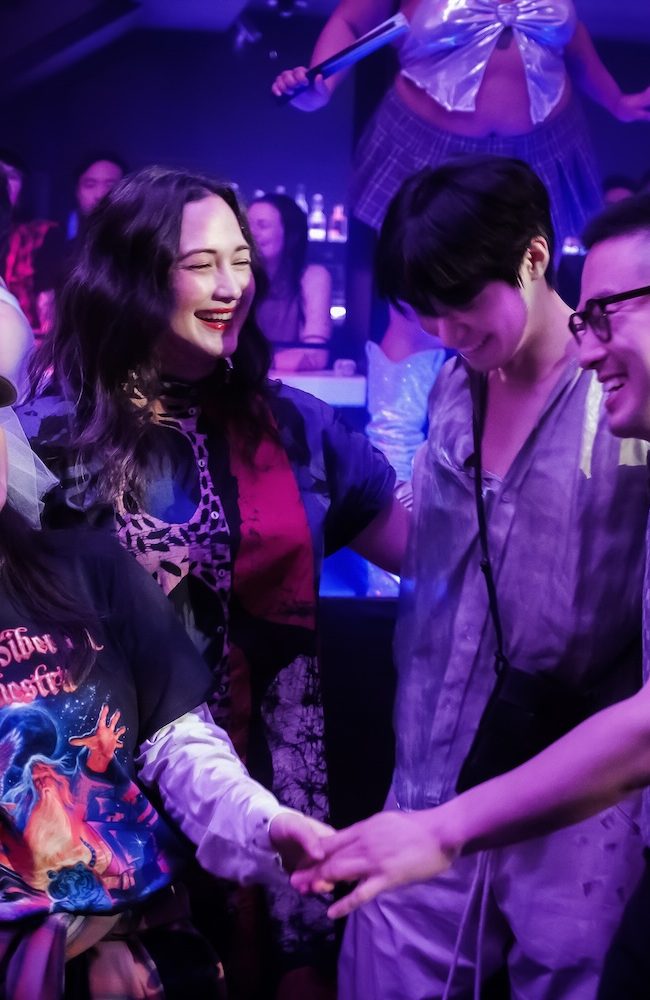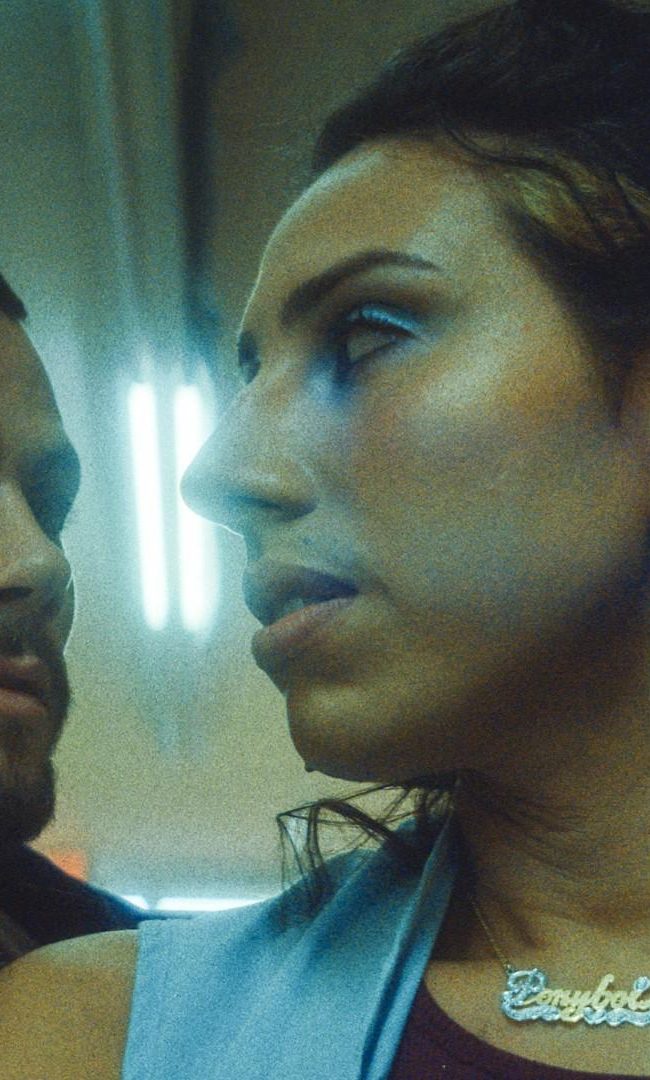A Conversation with Luiz Bertazzo, Gil Baron & Anne Celestino (ALICE JUNIOR)

t’s so easy during pride month to find films that speak to the difficulties of our experience, and I’m not saying there’s anything wrong with that, but it’s nice to smile about. It’s nice to look at smaller stories where people face difficulties one on one as opposed to fighting an institutional evil so that we can see everyone has a chance for happiness. One of my favorite films of the last few years is the Brazilian comedy Alice Junior which perfectly captures the trials and tribulations of being a teen girl in high school. Of course Alice is also trans and that is a very complicated issue in Brazil but the film consistently avoids all the clichés that have become embedded in Hollywood examinations of the same issues. When the film was playing the Festival circuit back in 2020, I had a chance to interview Luiz Bertazzo, the director, writer and lead actress of the film through the help of another actor (Emmanuel Rosset) in the film who served as our translator.
[please note, in Brazil, common usage of language differs from the US. Members of the transgender community are often referred to as ‘a transgender’ such as ‘it’s hard to be a transgender’ whereas in the US we would say ‘a transgender woman, etc.’ I have not changed the speakers words to reflect our own cultural values but please always use a community’s most preferred local identification terminology.]
Hammer to Nail: So thank you for making the film. I can’t imagine how powerful a film like this existing would have been when I was the same age as Alice and seeing a intricate portrayal on screen. I guess I just want to start with a little bit behind the impetus of the film. Luiz [Bertazzo], you wrote the film, can you tell me a little bit about the idea, and maybe, what was the first thing you knew absolutely was going to be in the film? Some sort of kernel of a scene.
HtN: I appreciated that it didn’t have to get too dark or too violent, or anything like that. And yet, when you are in high school, when you are at that age, things like acceptance of your peers or cyber bullying, those are sort of…that is the violence of the time and that is almost as bad at that age. Gil, can you talk a little bit about those choices and the decision about what sort of things she would face?
Gil Baroni: Okay. So he thinks Anne should answer the question, but he believes that it’s a most important part of age transition, and there was nothing in Brazil that would reflect this moment for these types of…for these transgender youths of coming out of puberty. And so that’s why I chose that part, but I think Anne should also answer what she feels, what she thinks about this period too.
Anne Celestino: I think it’s very necessary, movies that talk about the violence in the transgender community, because there is a lot of violence in the church and the community, because there is a lot of transphobic people in Brazil and in the world. And Brazil, we have one of the largest and visible communities in the world. At the same time, the country is very…Contradictory.
HtN: Was there any moment Anne, of something that happens to Alice that particularly read as authentic to you, that you really understood?
AC: As a transgender girl myself, I went to high school as a transgender too like Alice did. So I went through a lot of things that Alice went through, a lot of things that the movie to speak with me, talk with me, to understand better the transgender issues to put in the movie. I can relate to a lot of things that Alice has been through.
HtN: Gil, what excited you about this script and the story, and what made you want to make this film?
GB: I was highly interested in this movie because it was something new, it was something that showed really the life of a young transgender, and it was… In a sense, it’s a love story of a young girl that wants to give her first kiss. So this is very romantic in a way, and it’s also within this family setting, which is also another nice thing related to the movie. What he really liked a lot about the script or the story was the reality that Anne in the movie, she is really well received by her family, by her father.
And you see that there is harmony between the two, because in normal life here, at least in Brazil, transgender people are generally disconnected from their family. They are left alone to survive in any way that’s possible.
And that also contributes for the fact that their life expectancy is extremely short here in Brazil. It’s 35 years of age, and this movie permits a wide variety of people to see that it’s absolutely possible that love permeates in any kind of situation.
HtN:: Oh, that’s beautiful.
HtN: Yeah. Well, one thing you mentioned a little bit earlier was the idea of it’s really about a girl wanting to have her first kiss, and that’s one of the things that I really loved about the film. There’s some universality that everybody goes through in high school. Wanting to find your first kiss, having that crush that isn’t reciprocated, having to go to a new school and not fitting in, trying to find a group of friends who understand you.
Those are all things that everybody can associate with, and I think that really does say to people like, “Look, people who are transgender are just like you, and then they also have other things that they’re dealing with too.”
I would love to talk a little bit about how Anne got involved in the film, because it seems like she is such an integral part of this film. It’s like, it would be unbelievable to think that there was a version of this film that she maybe wasn’t attached to yet.
It seemed like maybe, she had…this had to be birthed for her or something, but I’m sure that’s not true. So can you tell me about how you found her and Anne can you talk a little bit about when you read the script and what you felt about it?
AC: Okay. I’m going to answer in Portuguese too, and I’ll let my dad translate that, so it’s up to you dad.
ER: I think you should try daughter. Your English is very good.
AC: No, no. My English is not that good, my English is not that good.
ER: You went to great schools, come on. Thanks to me, you went to great schools.
AC: So, one day I saw an ad. I saw a post where they were looking for a real transgender actress, because many times transgender actors are not really transgender. So this time they really wanted a real transgender actress. And they quickly got into contact, Gil and Bertazzo. They did some casting via internet, and they fell in love with me. And we quickly got together to talk about the project. And what was fantastic for me is that Gil and Bertazzo let me be as free as possible to include what it was like to be a trans.
ER: She taught a lot of…she gave a lot of information to Gil and Bertazzo about what it’s like, the life of a transgender. And they, in exchange, permitted her to act very freely and to add certain things that were part of her life to make it as real as possible.
HtN: Wonderful. Luiz or Gil, what’s something that’s in the film that could only have been in the film because Anne brought it?
LB: I have one. In the part of the movie when Bruno said to her, “You don’t look like a transgender,” and I know that it’s not that good a thing to ask, to talk about, but I don’t know why. So I asked Anne, and she said that speech in the movie, she said it and I wrote so its possible in my script.
HtN: That’s funny that you say that because that is a moment that I was like, “Yes, yes! That was perfect, it was a perfect response.” So good work to both of you on that. Emmanuel, I feel like we’re putting you to work.
ER: That’s okay.
HtN: I want to give you something for yourself to answer. So tell me a little bit about what it’s like to play a father to Anne on screen. You have to carry a lot of weight being both the sort of moral authority, the cheerleader, but also you have to kind of keep her head in the real world and sometimes you kind of have to slow the brakes on her a little bit.
It’s a very delicate situation and it’s especially interesting. I guess I didn’t make the connection until I watched it the second time, but your character’s name is Jean Genet, so she was named after you.
ER: Yeah.
HtN: And that for me actually, I’ll just be honest, it’s a very personal thing for me because I was actually originally named after my father, and had to take a different name. And so that is…it’s a very interesting situation where she has taken a different name and yet… So you’re reminded of that every single day. Talk a little bit that relationship, which is really complicated?
ER: I think I’ll simplify your answer. When I read the script, I immediately fell in love with the character. Exactly for those reasons, because in this, my character is a welcoming father, a helping father, at the same time a demanding father, but present, helping, loving. Basically I think it’s the… I don’t want to say it’s the definition of the perfect father, but not far, whether the child is transgender or not, I’m sure the child would be very happy to have a father like that. And so it’s even better for Anne who is a transgender, and to show the world that a loving father can help their children just in any normal way.
HtN: There was a part of me that assumed you were going to respond in Portuguese and then translate for yourself. Right. One thing that I would really love to talk about with Gil is the style of the film, because I think what sets this film apart from many other films is the tremendous use of the capabilities of film, with all the sort of hand-drawn animation that occurs overlay.
And then the use of music, it’s scored with popular music, but it really touches into her own kind of… you dive right into our heart with the music. I feel like it’s her score, it’s pop music. Because of course, it’s not going to be some piano score or something like that. It’s pop music, right? And she gets such a tremendous ability to talk to the audience through these video logs, and those are super stylized. So can you talk about when that became part of the film and what you decided, why you decided, “Okay, this is the thing that needs to be outlined. This is a thing I’m going to add to,” that sort of…those decisions?

GB: I wanted the movie to be very modern and that should be a blogger, basically. Anne, in reality has a blog and that permitted myself and Bertazzo to use this idea, because what they really wanted, they wanted Anne to look into the eye of the people, of the spectator and share her emotions, share what she’s going through with everybody else in a very young and generational way of today. It’s extremely modern this movie in a sense, with all the techniques that we use. Yeah.
Talking to the public as a way of bringing the public from outside to inside of yourself and of sharing your problems, your life with other people and vice versa. By looking at each other eye to eye, basically through the camera.
ER: They originally thought of making this movie as a musical, and rapidly they changed their ideas but they included a lot of composers who are themselves trans in the movie, they wanted the movie to be very pop, very popular.
HtN: What about the choices to like when things were drawn, like when somebody was outlined or sparkles flying off, what was the… When did you make that choice and then why? Not why did you do it, but why in that moment, did she sparkle?
GB: During the phase of editing, we realized that there was these moments that we wanted to highlight, and the idea came because we were always jotting down on pieces of paper, ideas, thoughts and making little drawings, and that kind of communication came out and we decided to include it into the movie, into the important parts.
HtN: Louis, I know that right now, Brazil is undergoing what we’re undergoing here in America [it was 2020] with a little bit of a more oppressive regime, a President who is not as supportive of the LGBT population as maybe in past years. This seems like an interesting time to be bringing… To have this film and have it out. Are you a little worried about what the public response will be? Tell me a little bit about the atmosphere right now in Brazil?
LB: I’m not…I think that, that moment, it’s not the best for us LGBT community, for sure. But I I really think that our movie is about love, and I think that this love will… Emmanuel help.
ER: [translating]: Magnetize all the people that love this movie and want to watch this movie and want to love Anne and us. And I think I don’t have any fear about that because it so has a lot of trouble now in Brazil that I really don’t know if this movie is a problem to us. I think it’s about love and this love, it will transport us.
HtN: I am hopeful that, that is the case.
– Bears Rebecca Fonté (@BearsFonte)
Alice Junior movie review; Luiz Bertazzo, Gil Baron, Anne Celestino











